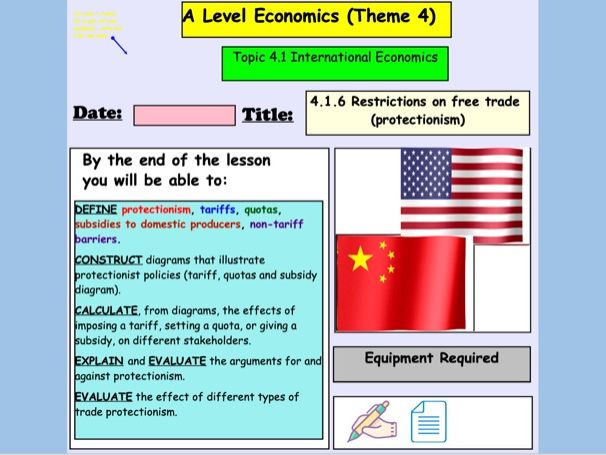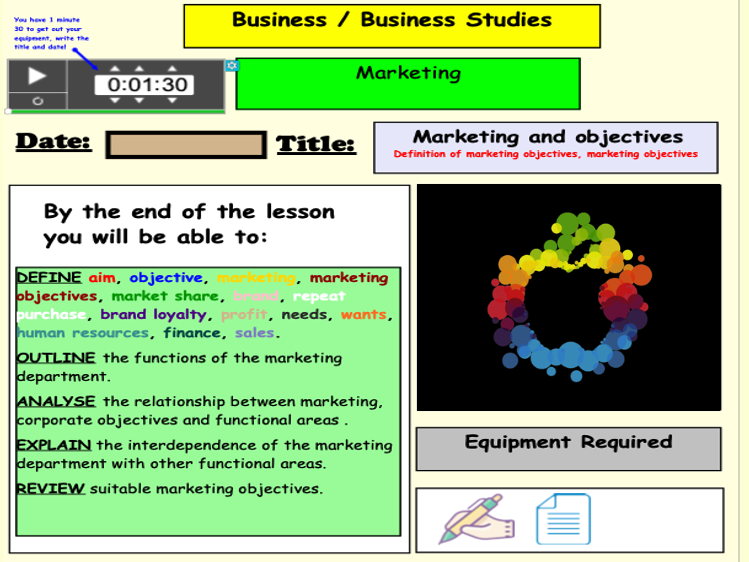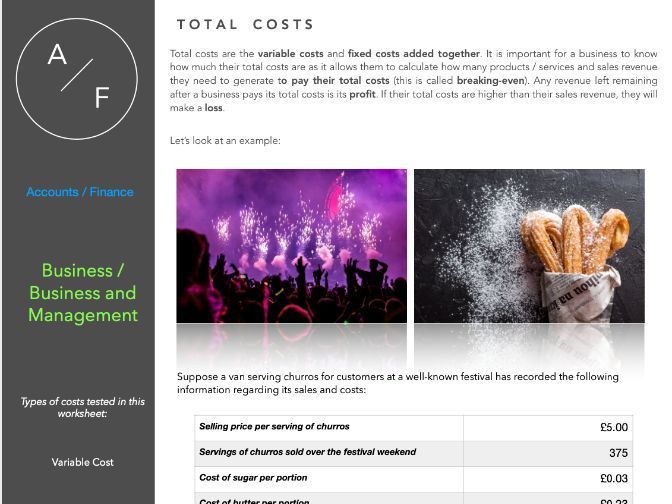84Uploads
10k+Views
6k+Downloads
All resources

Consumer and Producer Surplus
Included in this PowerPoint:
Colourful and engaging slides
Guess the question starter activity with answers (questions and answers cna be changed)
Detailed notes
A range of activities throughout with answers
Step by step demonstrations on how to show and calculate both the consumer and producer surplus
This presentation contains 38 slidea and took me an hour to go through with students

Finance Assembly Sixth Form
This PowerPoint contains 40 slides that informs sixth form students about managing their money effectively once they finish school or college regardless of whether they are entering employment, a university course or apprenticeship.
Included are:
Introductory information on number of students who don’t finish courses and apprenticeships and top 5 reasons why (number 2 being poor financial management)
Importance of budgeting
Overdrafts
Interest, EAR rate and APR rate
Credit cards
General advice
It took me 30 minutes to go through the presentation in assembly but can also be used in a lesson

Cash Flow Forecast Activity
Test your students’ knowledge of cash flow forecasts with this UNIQUE activity that demonstrates if students can calculate each of the different values.
This cash flow forecast contains a number of intentional errors that students need to identify and correct.
All instructions are included in the activity, but the key thing to note is that all yellow values cannot change, any others can.
Included in this activity are the following:
Page 1 - Instructions on how to complete the activity, a cash flow forecast (in colour) and an explanation of what the first error is and how it should have been calculated.
Page 2 - All errors have been circled. This can be shown after the cash flow forecast has been completed.
Pages 2 and 3 - Detailed explanations of all errors and how they should have been calculated.
Page 4 - The completed cash flow forecast with all answers.
How I run the activity:
Give students up to 10 minutes to complete the cash flow forecast
Once finished, ask students to explain any errors they have found (this took my class 10 minutes)
Show the circled errors on the board so that students can circle them
Explain each error in detail
Show the completed cash flow forecast on page 3 and get students to mark them. This will save you time.

Profitability Ratios (Gross Profit Margin, Operating Profit Margin, Return on Capital Employed)
A colourful and engaging resource designed for introducing profitability ratios (gross profit margin, operating profit margin and return on capital employed).
Included in this presentation:
A colourful title slide detailing the learning (lesson objectives) and equipment required for the lesson
Two detailed and colourful slides explaining what ratios analysis is and why it is conducted.
An introductory recap activity where students are required to calculate missing values for an income statement and balance sheet (answers provided)
Step by step and contextualised examples of how to calculate all three profitability ratios
Activities on all three ratios for students to complete (answers provided)
Explanations, analysis and evaluation of what could cause these ratios to improve and worsen.
This resource contains 29 slides and took me an hour and a half to fully go through.

Critical Path Analysis Worksheet
A detailed worksheet with a range of explanations and activities on critical path analysis and completing network diagrams. There are eight activities included, spread over 5 tasks, ranging from step by step guidance as to how the diagram is completed, to float times and identifying the critical path.
I’ve tried to make it as easy as possible for students and teachers to follow.
All answers have been included at the back. Save yourself some marking and give the answers for students to peer mark if you wish!

Comparative and Absolute Advantage
This is a complete lesson on comparative and absolute advantage.
The presentation explains both step by step and includes a range of games, activities and questions throughout.
There are also a couple of past paper questions with answers at the back.
A key term editable starter activity is included at the start.
Engaging and colourful throughout.
This presentation contains 45 slides and took me an hour and a half to go through with my students

Break-Even Analysis Worksheet
4 Practice break-even diagram questions with answers provided
Can be printed used in lessons or as revision

Eduqas A Level Business Exam Tech (Part 1)
This 55 slide resource covers key exam technique skills for Eduqas A Level Business.
Presentation is comprehensive with detailed explanations, examples, questions, mark schemes and links.

Cash Flow Forecast Full Worksheet
This worksheet tests students understanding of the importance of cash, cash flow forecasts and how to solve cash flow problems.
There are five activities included in this resource:
Activity 1 - A fill the blanks activity testing students’ understanding of key cash flow terminology
Activity 2 - A cash flow forecast with missing values that students will need to calculate
Activity 3 - A true or false activity that tests students’ ability to interpret the information from the cash flow forecast they completed for activity 2
Activity 4 - An anagram activity where students have to solve five anagrams of ways businesses can solve cash flow problems. Once solved, they need to briefly explain how each method helps with poor cash flow
Activity 5 - A picture round where students look at 9 good and services, and have to decide which four of the nine are likely to experience short-term cash-flow problems. A brief answer is required underneath explaining their reasons for each answer
All answers have been provided in depth
This can be completed in class / for homework / as a peer marked activity to save you marking!
This worksheet took students around 25 minutes to complete

Price Elasticity of Demand WORKSHEET
A detailed and colourful worksheet designed to test a range of skills covered in this topic. The worksheet contains 6 activities, each taking between 5 and 15 minutes to complete. It took most of my students between 45 minutes and an hour to finish this worksheet. The activities are as follows:
Activity 1 - A fill the blanks activity that test students’ knowledge of the vocal and terminology used
Activity 2 - Calculating PED, percentage changes and recognising the different types of PED
Activity 3 - ‘Developing your answers’ - students need to recognise and explain factors that influence PED
Activity 4 - Revenue boxes
Activity 5 - Diagrams
Activity 6 - More complex calculations / application
ALL ANSWERS ARE PROVIDED IN DETAIL and have been written in a way that is broken down for students to easily understand. I ran this activity as a peer marking exercise and collected everyone’s work at the end of the lesson to check if there were any gaps in understand to review the following lesson. This saved a lot of time!

Economics as a Social Science WORKSHEET
Included in this worksheet:
Activity 1 - Match the key term with the definition based on key terms included in this topic, such as the economic problem, utility and ceteris paribus
Activity 2 - Challenge the economic assumptions (a key skill for an A/A*)
Activity 3 - Select whether the scenario is micro or macro
Activity 4 - Trivia on UK economy in 2024
All answers are included so the activity can be marked by the teacher / peer / self marked
The activity took around 10 minutes for my students to complete

Critical Path Analysis
Included in this resource is a detailed, colourful, engaging and informative presentation on critical path analysis. I have broken this topic down in easy to understand sections as students often find it very challenging.
The PowerPoint contains:
A detailed and colourful title slide that includes all learning objectives
A fill the blanks recap starter activity on ratio analysis / financial statement. All answers are included.
An explanation of what project management is and its importance. Contextualised examples of projects applicable to critical path are included
**A hyperlink to a great video **of Apple’s new HQ is included. It shows the scale of the project, cost and time taken
An activity where students learn the importance of completing activities simultaneously to save time rather than a sequence
A step by step breakdown over 10 slides on what a network diagram is, what the values and characters mean, and how to work out EST, LFT, critical path.
5 network diagrams ranging in difficulty all with answers provided
Detailed notes and activities on float times
Notes on the advantages and disadvantages of critical path as well as how to evaluate the usefulness of critical path analysis as a planning tool
A separate supplementary worksheet is included in this resource with all of the activities included in the PowerPoint. These can be printed for students. All answer are in the presentation.
Animations have been used throughout to make this as engaging for students as possible
The presentation contains 52 slides and took me two and a half hours to go through with students.

Protectionism (Economics)
A detailed (102 slide) PowerPoint presentation on tariffs, quotas, trade subsidies and other forms of protectionsim.
This presentation includes:
Colourful slides
Videos
Activities
Links to syllabus
A detailed step-by-step instructions on how to draw tariff, quota and trade subsidy diagrams
Homework activities
Contextualised examples

Market Share Worksheet with Answers
20 multiple-choice questions on market share. The questions focus on calculations, definitions and an interpretation of values.
Students can mark answers themselves.
Save yourself some time!

Balance Sheets (Statement of Financial Position)
The topic of balance sheets is one that many students (as well as teachers!) find challenging to grasp… This colourful, informative and engaging lesson has been created with this in mind by breaking down the topic down and guiding students step-by-step, using a range of clear explanations, fun activities and demonstrations. Colour, appealing fonts and images have been used throughout.
Included in this presentation:
A colourful and informative title slide, outlining key concepts, skills and learning objectives.
Three starter activities (for the purpose of differentiation) that reviews what the income statement is, how different values are calculated as well as profitability ratios. Each activity has differing levels of difficulty, so you may do as many or as little as you choose. Detailed answers to each activity are provided.
An embedded link to a Kahoot Quiz I have created is imbedded on one slide, and introduces students to concepts of assets, liabilities and equity. The Kahoot has 10 questions where students have to answer mind-blowing facts about Apple, such as how many patents its owns and the amount of cash they have in the bank. Each question contains an image / gif to engage students.
Detailed, broken down and contextualised explanations of types of assets and liabilities
An activity where students need to identify types of assets (answers provided)
An activity where students need to categories assets, liabilities and equity
Step by step instructions (using engaging colours) to explain how the balance sheet is calculated
An easy to understand explanation as to why the balance sheet has its name, and assets / equity and liabilities are always equal
Explanation of why balance sheets are produced and what many of its uses are
A challenging activity where students need to calculate values in a balance sheet.
I have found this resource great in helping students understand the topic and is a great introduction to future topics, such as liquidity ratios.
This lesson took me 3 x 45 lessons to complete as I used all three starter activities with my students.
File size is just over 400MB

Marketing Objectives
A colourful and engaging resource on Marketing Objectives.
Included in this presentation;
A colourful and informative title slide outlining learning objectives. This slide includes animations
A Catchphrase starter activity where students guess the name of a business or product fro a range of picture clues
A recap fill the blanks starter activity that tests what student have learned about marketing so far (PowerPoint slide can be printed for students and answer key included)
Explanation of aims, objectives and mission statements
Match the mission statement activity
Detailed and contextualised notes on marketing strategy, SMART objectives
There are 35 slides in total and this lesson took me an hour to complete

Index Numbers
Complete lesson with additional worksheet on index numbers.
Included in this resource:
Activity on why quantitative skills are important in economics
Explanation of what index numbers are and why they are used
Step by step instructions are to how index numbers are calculated
8 activities on index numbers (all answers included)
This lesson took me an hour and a half to go through with my students

Capacity and Capacity Utilisation
A 52 slide presentation detailing capacity and capacity utilisation.
This presentation includes:
A depreciation starter activity
Introductory activity on the concept of capacity
Examples of capacity utilisation in different contexts
Calculation activity
Activity demonstrating hoe capacity utilisation impacts costs / average costs
Detailed notes throughout
This lesson took me an hour to go through.

Types of Costs WORKSHEET (Fixed, Variable, Total, Average, Marginal, Direct, Indirect)
This worksheet contains revision notes and activities on how to calculate fixed costs, variable costs, total costs, average costs, marginal costs, direct costs and indirect costs)
All answers are included
The worksheet is colourful and creative throughout
This worksheet contains 7 pages of activities and took my students between 30 - 45 minutes to complete
Can be given as classwork / homework / revision

Payback Period (PBP) Worksheet
A simple worksheet where students need to calculate the payback period of 4 investment options.
Answer key included




















